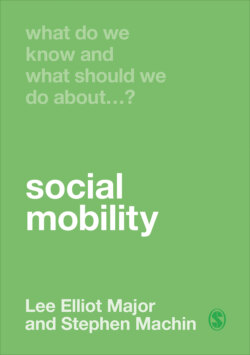Читать книгу What Do We Know and What Should We Do About Social Mobility? - Lee Elliot Major - Страница 10
На сайте Литреса книга снята с продажи.
Social Mobility Research
ОглавлениеTo our knowledge, the term social mobility was first coined in the early twentieth century. The Russian–American sociologist Pitrim Sorokin was himself a story of upward mobility – a trait of many scholars in this field. In 1922, he fled from Russia, evading capture by Lenin's forces as the Bolsheviks consolidated power after the Russian Revolution. Sorokin emigrated to the United States where he founded Harvard University's sociology department.
Sorokin was a keen political activist and was interested in the stratification of societies into lower and upper classes defined by their wealth and power. Tracking the backgrounds of people entering various elites, Sorokin studied what he called vertical social mobility – ‘any transition of an individual, social object or value…from one social position to another’ (Sorokin, 1927). Vertical mobility could occur when individuals leaped from one class to another. On the other hand, it could describe the movement of whole groups or people closer or further apart.
Over the last century, the field has gone from data poor to data rich. The golden era of British sociological studies after the Second World War was founded on nationally representative cohort surveys offering rich details of parents, families and children. However, even these studies seem small scale compared with the big data era of the early twenty-first century.
Chetty et al. (2014b) used the tax records of some 40 million Americans to reveal a detailed map of upward mobility levels for children born between 1980 and 1982 in different cities, counties and states across the United States. This landmark work based on extremely rich data shows how far social mobility research has advanced.
Data are the life blood of social science. The UK has been blessed with national cohort studies enabling researchers to gain numerous insights into the changing life experiences and outcomes of successive generations. The 1970 British Cohort Study (BCS) follows the lives of 17,000 people born in England, Scotland and Wales in a single week of 1970. Other birth cohort studies include the 1946 Medical Research Council National Survey of Health and Development (NSHD), the 1958 National Child Development Study (NCDS) and the 2001 Millennium Cohort Study (MCS).
Without the findings from these studies, we would live in a less enlightened world, less equipped to face future societal challenges. It is criminal that social mobility research in the UK has itself suffered its own dark ages. We have no nationally representative datasets of similar quality tracking generations born in the 1980s and 1990s. The studies were victims of cuts to social science research under Margaret Thatcher's government. Thatcher's children are the lost generation at least in research terms. It is a tragedy that no British cohort study has been commissioned since the Millennium. Future researchers will be left guessing about the generations born in the 2010s (and perhaps 2020s), and will have to use different types of analysis and data to try to fill the gap.
